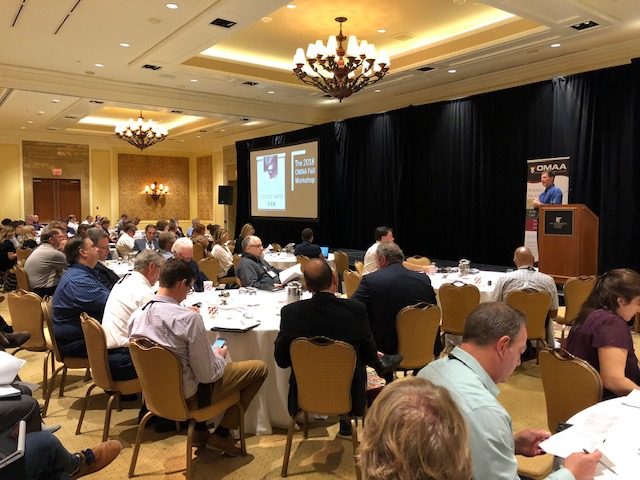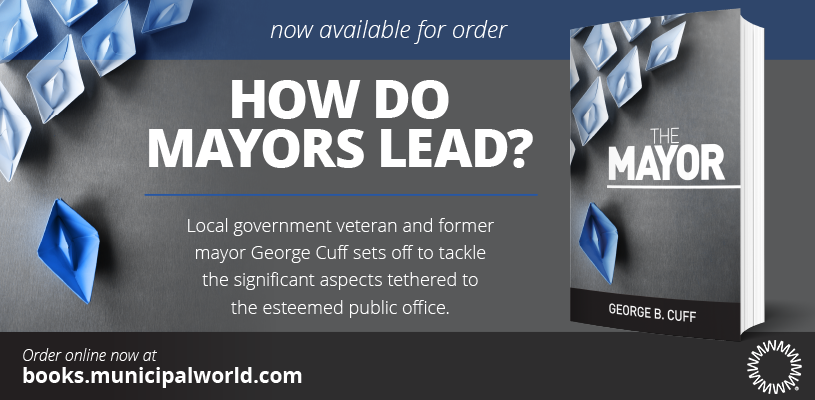2018 OMAA Fall Workshop report: Bringing our future into view

From October 24-26, the 2018 Ontario Municipal Administrators’ Association (OMAA) Fall Convention was held in beautiful Minett, Ontario – with a theme of “bringing our future into view.” It represented an opportunity for senior members of Ontario’s municipal administration to gather, connect, and learn from a diverse range of speakers on a wide range of topics. And, Municipal World was there to cover it all …
An Evening of Laughs

The first night was highlighted by an evening of laughs, groans, and games hosted by comedian Adam Growe. Growe, the veteran stand-up comedian and host of the TV gameshow Cash Cab, entertained and engaged the audience with a mix of witticisms, games, and prizes.
Lessons from a Champion
The opening keynote was presented by Ryan Walter – businessman, author, speaker … and Stanley Cup champion (1986, Montreal Canadiens). Walter drew on his experiences from the sports world to put the emphasis on culture – positive culture, negative culture, and the differences in between. His own experiences taught him a number of things: one of the biggest differences between organizations with successful cultures and ones with struggling cultures is language. Language is critical: teams that lose blame; teams that win take personal ownership. Read the full article here: https://www.municipalworld.com/feature-story/leadership-lessons-locker-room/.
The Power of Political Acuity

Dr. Peter Constantinou took the opportunity to share a summary of his research on “political acuity in municipal administration.” Describing it as “a way of thinking and behaving, putting info and skills together to better guide choices and behaviour in a given context to accomplish goals and objectives” – a wide variety of diverse skills that when put together properly.
The challenge is that while we have the way things are done formally, there are a lot of things that are done informally in the municipal organization. It means that you need to be aware, it means that you need to focus on reading people and situations, seeing alignment, and environmental scanning. Every time we can’t explain something, it’s often dumped into a big “garbage can” known as politics.
Oftentimes, municipal leaders are faced with difficult decisions, with competing evidence and facts, and no easy way out. Therefore, it’s important to apply various lenses – whether its political or, more importantly, an ethical lens. For example, how do you deal with only having more funding for one of police or EMS; or for having money for only putting in affordable housing or emphasizing transit? There’s no great answers, and the answers are seldom formal. Further, there is a challenge of optics – you can follow the rules and still get in trouble. It’s easier to pile on and get the situation resolved, rather than getting the answers.
So, with that in mind, there’s a challenge: how do we prepare people for a career in public service when so few rules are written down? It means training – acuity training is valuable. Acuity training will help prepare people for public service, and it’s not necessarily a one-time event. It offers an opportunity for continuous coaching and mentorship, and it will make communities stronger.
Updates on Municipal Law and ICs

A pair of short sessions: from Ed Veldboom (Russell Christie) on municipal law updates and John Fleming on integrity commissioners.
After a brief primer on case law, Veldboom focused on three cases – the recently-completed lawsuit on Toronto’s council, a second anti-SLAPP case, and a case involving the Environmental Review Tribunal.
On the issue of Toronto’s council, Veldboom spent a bit of time on the concept of fairness – how judges tend to focus on fairness, and some will “reverse engineer” a decision to make it fit a predefined view of what fair includes. In this case, Justice Belobaba started to equate different elements of the Charter together, and actually got it wrong. Of great importance, and something that should be of no surprise to anyone, it comes back to the fact that municipalities are “creatures of the province.” There is no guarantee that we are entitled to vote in a municipal election – it’s only provincial and federal. And, based on that, he confirmed that the Court of Appeal got it right in overturning the decision.
The case that involved the MOECC and CNR was potentially more interesting for municipalities. After an oil spill, CNR was involved in the clean up, and the ministry was involved as well, but only in an oversight role. After that was completed, the ministry used its prerogative to charge CNR to pay the costs for MOE oversight – even though they weren’t in an active role. The review was completed by the Environmental Review Tribunal (the nature of the legislation said this could not be appealed directly to a court). And, the ERT confirmed, for a variety of reasons, that the MOECC was completely reasonable to make those charges. So, what does that have to do with municipalities? Municipalities have very similar powers based in legislation. It means that municipalities would be wise to look at ways to recover costs when dealing with costly environmental cleanups.
On the issue of integrity commissioners, John Fleming spoke poignantly on the role, and the fact that sometimes they’re more akin to kindergarten teachers than anything else. Fleming touched on codes of conduct, and some of the key points – respect, civility, and diversity – and also asked one key question: how does one manage the line between things that are in violation of a code of conduct versus things that are simply part of “politics.”
March 2019 is a major date for ICs. Not only are municipalities required to have one in place by March 1, there is a new role: the ability to conduct inquiries on conflict of interest, and to forward findings to the appropriate authorities as necessary. It means that ICs need new, sharpened skills, and who knows what the future will hold.
For those municipalities who still haven’t hired their ICs, Fleming spent a little time on outlining key considerations: finding an IC that meets the needs of both the council and the community, the fact that its not necessary for a municipality to go it alone and can share services with other municipalities, and the process for finding one.
Learning from Experience

Marijuana legalization is something that municipalities have to deal with on a variety of fronts. So, of course, having more information is always a powerful tool. Two speakers brought information on marijuana: Ron Shaw from StrategyCorp and Patrick Goff of Wheatridge, Colorado.
StrategyCorp recently completed a survey of municipal administrative leaders, talking about some of their biggest concerns. The results of the conversations revealed five key areas of concern: public safety, by-laws, finances, health, and zoning. Some of the key questions/points of concern include:
- Overstretching police services
- Impaired driving
- Added costs
- Increasing demands to the social safety net and how to fund it
- Managing cost recovery
Gaining insight from experience is always valuable. Wheatridge, Colorado has been dealing with legalized cannabis (at least at a state level) for a number of years, and administrator Patrick Goff brought his experience to the crowd. Despite having different regulations and legislative frameworks, some of the messages that he had were poignant – listening to the community is vital; zoning and business licences are valuable tools for controlling the sector; and generally, there was success with the legitimate sector, while homegrows represent a much larger problem. He cited the fact that his community had a relatively low level of crime, and managed to have a net positive financially.
His key takeaways included that municipalities need to be nimble and flexible – you can’t anticipate the imagination of every entrepreneur, things are going to need to be addressed (Goff mentioned the case of a marijuana yoga studio), and that there were a number of questions still to answer: for example, when does private consumption become public, is the smell of marijuana enough to search a house or car, and how do we properly and accurately measure impairment, as there are still no great tests.
The picture that Goff presented was that legalization is not the end of the world. It requires diligence on the part of staff, it requires training for police, and there will be some disruptions. However, despite a degree of disruption, his community has managed just fine.
Cybersecurity – Protecting your Digital Assets
Wasaga Beach … Midland … Atlanta, Georgia – just some of the communities that have recently been hit by cyber attacks. Communities’ servers are increasingly being held hostage by hackers demanding money – and municipalities are either forced to pay out, or try and handle the mess themselves. It’s a dangerous time for municipalities, and speakers Jessica Jaremchuk from Frank Cowan and Frank Fazio from CySat were there to present on some of the risks and strategies to help protect your organization.
If it seems like attacks on communities are on the rise – they are. Public sector hacking is outpacing private sector hacking, since it’s perceived that municipalities have money to spend and they hold a treasure trove of valuable information. At this point, most of the attacks are limited to servers, which are dangerous and embarrassing, but manageable. Bigger challenges might exist if hackers were to infiltrate water service systems or power plants – meaning entire communities or regions could be held hostage.
There are increasing regulations about what a community that is hit needs to do, and should do once they have been attacked. Midland and Wasaga Beach each spent over $200,000, even though the hacker only asked for $35,000. Costs related to outside specialists, alerting people to breaches, solving the underlying problems, etc. are expensive.
Jaremchuk outlined a few best practices for risk mitigation: first, know where the political leadership stands on issues of ransom. Second, have a plan in place. Third, consider having insurance. These practices all tie together for a common reason: it is much easier to fix the roof while the sun is shining – the worst time to be deciding on policy or negotiating with service providers is in a crisis. Insurers will often have rates and suppliers lined up, making an incredibly stressful time marginally easier. An important part of having a plan in place is doing a comprehensive review. Do you have response plans, data recovery plans, or business continuity plans? Do you have policies to deal with acceptable use?
One thing that both Fazio and Jaremchuk agreed on is that it is about building a culture of digital safety. It’s about making sure that everyone is diligent, that information security is not limited to one person or a small team, and that you train and know and take advantage of best practices. Test your staff – regularly – for compliance. Who’s clicking on the scam emails? Who’s not being diligent? It represents a vitally important training opportunity.
Fazio spent the second half of the presentation speaking from a mentality of a hacker. Namely, he answered the question: just how is it that hackers attempt to access data. It wasn’t meant to scare the audience, but it shows the level of sophistication that those with nefarious purposes will use to get access to valuable data. Hackers don’t necessarily just try to deal with software, they are attacking people as well, using social engineering to get people to do dumb things. Everything from spoofs to password cracking to “juice jacking,” Fazio spent time laying out why municipalities and their staff need to create a culture – something that extends beyond just office computers to every piece of technology that staff uses.
5 Generations in the Workplace

The amount of diversity in our workplaces today is endless. However, with diversity, comes a whole set of challenges. How do managers balance the frustrations between generations? How do they handle the inevitable “churn” of younger generations? How do they promote the acceptance of diversity? And, how do they manage the needs of these generations against their own, personal needs? These are just a few of the questions that Catharine Vickery, HR advisor for the Muskoka District, and Bill Winegard, ED for the Municipal Retirees Organization Ontario, addressed in their workshop: Communicating, Coaching, and Coping: Managing 5 Generations in the Workplace.
According to Vickery, the workplace is like a forest. The different ages of trees (workers), combined with a variety of species diversity (race, sexual orientation and identity, religion, personality, thinking styles, etc.), make a strong forest (workplace). And, it is up to our CAOs and managers to develop strategies to ensure that their forests thrive, whether that means attracting, inspiring, and retaining the entering generation, or valuing the knowledge and experiences of the exiting generation.
Vickery and Winegard delivered insightful presentations on the needs, desires, and perspectives on the top three generations in the workplace: the Millenials (Generation Y); Generation X; and the Baby Boomers. Together, they opened the floor to discussion about how CAOs and managers can go about addresses these needs on an individual level, as well as a corporate level.
A Changing Political Landscape
Sandra Pupatello closed the 2018 OMAA Conference, speaking to the role of CAOs in a changing political landscape, as well as to women in leadership roles.
There needs to be an active plan to seek out women leadership. According to Pupatello, women don’t ask like men do – they don’t presume that they can aspire to the job like men do. It is our responsibility to reach out and say exactly what we think these women are good at and that they should do it – they should run for leadership.
According to Pupatello, provincial governments are continually moving along the political spectrum. And, while CAOs may be the leaders, motivators, prompters, and insightful managers of a municipal team, they also have to readjust to cycles of change, both internally and externally. However, Pupatello stresses that change brings great opportunity, especially for CAOs. A new government brings new attitude, and with it, new opportunities to introduce innovative solutions to local, provincial, and even federal problems. With evidence-based proposals, CAOs can help find new approaches – new solutions – to old problems.
Great Conversations
Municipal World was proud to have the opportunity to have discussions with some of the key speakers and other guests at the event. Watch the Municipal World Media Centre (https://www.municipalworld.com/media-centre/) for the videos of those conversations in the near future. MW



